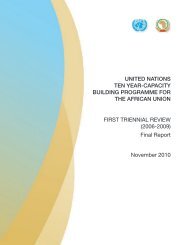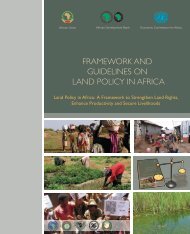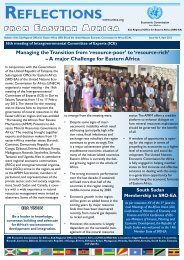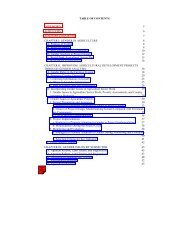A Decade of NEPAD - Economic Commission for Africa - uneca
A Decade of NEPAD - Economic Commission for Africa - uneca
A Decade of NEPAD - Economic Commission for Africa - uneca
Create successful ePaper yourself
Turn your PDF publications into a flip-book with our unique Google optimized e-Paper software.
24 A <strong>Decade</strong> <strong>of</strong> <strong>NEPAD</strong>: Deepening <strong>Africa</strong>n Private Sector and Civil Society Ownership and Partnership<br />
under the Cotonou Agreement which are developed with<br />
respective <strong>Africa</strong>n regions and countries.<br />
Additionally, the EU has established a 250 million Euro<br />
facility to support peace keeping ef<strong>for</strong>ts on the continent<br />
called the EU <strong>Africa</strong>n Peace Facility. The facility supports<br />
the AU’s Peace and Security Council. With the <strong>NEPAD</strong><br />
Secretariat, the EU has discussed the establishment <strong>of</strong> a<br />
Partnership <strong>for</strong> Infrastructure to initiate projects that<br />
facilitate interconnectivity at a continental level <strong>for</strong> the<br />
promotion <strong>of</strong> regional integration.<br />
In 2005, the EU <strong>Commission</strong> launched a new EU Strategy<br />
<strong>for</strong> <strong>Africa</strong> to begin to align its three existing Agreements<br />
(the Middle East Development Agreement (MEDA) with<br />
North <strong>Africa</strong>, the Cotonou Agreement with sub-Saharan<br />
<strong>Africa</strong>n states, and the Trade, Development and Cooperation<br />
Agreement with South <strong>Africa</strong>) into a more continentally<br />
focused strategy.<br />
In December 2007, the inaugural <strong>Africa</strong>-EU Summit was<br />
held in Lisbon, Portugal and out <strong>of</strong> the meeting a Joint<br />
<strong>Africa</strong>-EU Strategy was established toward the development<br />
<strong>of</strong> a long term framework <strong>for</strong> <strong>Africa</strong>-EU relations.<br />
Eight areas <strong>of</strong> partnership were identified:<br />
ӹ Peace and Security<br />
ӹ Democratic Governance and Human Rights<br />
ӹ Trade, regional Integration and Infrastructure<br />
ӹ Millennium Development Goals<br />
ӹ Energy<br />
ӹ Climate Change<br />
ӹ Migration, Mobility and Employment<br />
ӹ Science, In<strong>for</strong>mation Society and Space<br />
The next <strong>Africa</strong>-EU Summit will take place in 2010 and<br />
one <strong>of</strong> the main objectives with EU relations with <strong>Africa</strong><br />
is to promote the attainment <strong>of</strong> the MDGs.<br />
Toward the achievement <strong>of</strong> the aims <strong>of</strong> the partnership, the<br />
EU has designated several existing financial instruments<br />
to support the <strong>Africa</strong>-EU Partnership, including:<br />
ӹ The European Development Fund<br />
ӹ The EU Infrastructure Fund <strong>for</strong> <strong>Africa</strong><br />
ӹ The European Neighbourhood Policy<br />
ӹ The Development Cooperation Instruments<br />
ӹ The European Instrument <strong>for</strong> Democracy and Human<br />
Rights<br />
ӹ The EU’s Common Foreign and Security policy Budget<br />
ӹ The <strong>Africa</strong>n Peace Facility<br />
ӹ The AU Peace Fund<br />
In particular, the new European Infrastructure Trust Fund<br />
<strong>for</strong> <strong>Africa</strong> is an innovative financing mechanism <strong>of</strong> the EU-<br />
<strong>Africa</strong> Partnership on Infrastructure as it brings together<br />
the European commission, member states, the European<br />
Investment Bank (EIB) and the European Development<br />
Financial Institutions to pool their collective ef<strong>for</strong>ts and<br />
resources to directly co-finance relevant projects. The<br />
Trust Fund also provides grants that will attract and leverage<br />
additional funds from other donors and the private<br />
sector. The grants cover: interest rate subsidies, technical<br />
assistance, project support and insurance premiums. The<br />
87 million Euro facility may grow by an additional 250<br />
million Euros based upon current discussions with the<br />
EIB and other donors.<br />
The European Union has also become a major supporter<br />
<strong>of</strong> the “Aid <strong>for</strong> Trade” initiative which was launched<br />
in 2005 by the World Trade Organisation. The Aid For<br />
Trade initiative promotes the provision <strong>of</strong> assistance by<br />
the international community to developing countries that<br />
need to address supply side constraints and to cope with<br />
transitional adjustment costs related to trade liberalization.<br />
Specific areas <strong>of</strong> assistance include: trade policy and<br />
regulation development and re<strong>for</strong>m, trade development<br />
support, trade related infrastructure, capacity development,<br />
and trade related government budget adjustment.<br />
The EU committed 2.73 billion Euros to <strong>Africa</strong> in 2007<br />
in support <strong>of</strong> Aid <strong>for</strong> Trade programmes, particularly<br />
regional integration supporting initiatives. Furthermore,<br />
the European Development Fund allocated 645 million<br />
Euros to the EAC-COMESA-SADC jointly coordinated<br />
North-South Corridor programme which was launched<br />
in Lusaka, Zambia in April 2009 27 .<br />
The EU has also established a 55 million Euro institutional<br />
capacity building initiative <strong>for</strong> the EU and <strong>Africa</strong>n Union<br />
and launched the ACP-EU Water Facility <strong>of</strong> 500 million<br />
Euros in support <strong>of</strong> the Millennium Development Goal<br />
number 10 which focuses on access to clean water and sanitation.<br />
The specific objectives <strong>of</strong> the Facility are to support:<br />
27 AU/<strong>NEPAD</strong> <strong>Africa</strong>n Action Plan 2010-2015: Advancing Regional and<br />
Continental Integration in <strong>Africa</strong>, Strategic Overview, Oct. 16, 2009, p. 16







